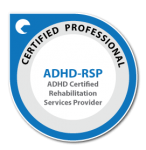

I saw a recent post in an online ADHD group from a parent who was frustrated that her 8-year-old was putting up a fight over her request for him to clean his room. It sounded like an all-out power struggle with him yelling and escalating to throwing things and her continuing to insist harder. It went nowhere and ended up with a lot of hard feelings. And a still-uncleaned bedroom.
Comments on the post were helpful and empathetic: “Understand that he’s having a hard time with it, not giving you a hard time.” “He needs step by step scaffolding.” “My daughter was the exact same way, so we broke it down into 5 minutes here and there to keep her from getting overwhelmed.”
Great advice, right? Except for the mom came back to say those dreaded words: “He knows how to clean his room. He’s done it before.”
I’m going to take a little detour here to explain why this is not a helpful mindset to employ.
I’m a runner. I’m not fast, but I’m not the slowest. I love 5 and 10K races. I have done two half marathons (13.1 miles). When I was training for those long races, I could run 8-, 10- and 12-mile training runs. My last half marathon was pre-Covid, in January 2020. Not long after I crossed that finish line, I stopped running high mileage due to no upcoming races, followed by a hamstring injury.
I am now on the mend and signed up for another half, in January 2023. I have a little more than 6 months to increase my mileage from maybe 3 runs per week of 2.5 miles each to that big 13.1 number. As of this writing, I was happy to get 3.25 sweaty miles out of my latest run, on a hotel treadmill, staring at the distance counter the entire time.
I wasn’t disappointed in myself, and I didn’t beat myself up for not logging more miles by saying, “but you’ve done it before.”
Yes, I have done it before. With consistency, with training, with all the right conditions (no injury, proper nutrition and sleep, a training schedule, and of course, discipline and motivation). I do amazing when I can!
I’m also an occupational therapist and an ADHD coach and life coach, and it’s basically my job to help people reach their full potential, so it would be logical that I apply the same concepts to myself.
Now take an instance in your own life and plug it in to this sentence: “Just because I have done (fill in the blank) before, does not mean that I can always do it”.
This is called being human.
Just because I’ve been patient with my son when he leaves his wet swim trunks on the wood floor, doesn’t mean that I can always ask him calmly to pick them up, or even do it for him without turning it into a federal case. Just because I have spent a whole Sunday cleaning the house, doing laundry and meal prepping for the week, doesn’t mean that I always have the energy to do that. Just because I’ve been able to respond calmly to a triggering situation in the past, doesn’t mean that I will always have the patience to react that way. Just because I can sometimes stand by and wait while my husband makes frequent stops when we are hiking to take pictures does not mean that I can always keep myself from muttering, “let’s move it, sometime today, babe”.
Adults, too, do well when they can. When we have the mental and physical skillset in the moment, we are at our best. We excel, we rock it, we blow our own minds with what we are capable of. I did those half marathons for myself and nobody else. I wanted to prove to me that in my late 40’s, that I could do something physically and mentally hard that I’ve never done before.
But it won’t always happen like that. Even if we feel at our best, there may be circumstances that prevent us from doing our best. Expecting someone (or yourself) to do the same thing consistently just because you’ve done it before is simply not helpful. Am I saying that we should drop all expectations of others and even ourselves? No. I’m saying that considering the circumstances of the moment in time that you have the expectation will help frame your idea of what that outcome will look like. And those circumstances – or the facts of the moment – will help you decide how to approach the situation thoughtfully and intentionally.
Let’s bring this back to the kids.
When you understand it about yourself, you can apply this same concept to children. First, their world is much, much smaller than ours. Theirs revolves around meeting lots of adult expectations – home, school, sports, extracurriculars. Their brains are not fully developed, and their executive functioning skills are lagging. Some of those skills can be serious roadblocks to getting things done. If you know me at all, or you’ve read my blogs or Instagram posts, you know that I fully embrace Dr. Ross Greene’s philosophy that kids do well when they can. I wrote about the Collaborative and Practical Solutions in previous blogs, and I often send parents to Dr. Greene’s website, www.livesinthebalance.org for more information. His books are amazing, and he also has a podcast. Because I so fully believe that it’s true, here are three tips for helping kids do well.
When you can truly believe that kids do well when they can, not if they “wanna”, as Dr. Greene likes to say, you will have the necessary mindset shift to move the needle toward collaboration and away from power struggles and epic battles. Using the previous examples, you can apply the same language to your child.
“Even though he has cleaned his room before, he cannot do it by himself every time.”
“Even though she has done her homework without being told before, she sometimes needs to be reminded.”
“Even though he usually remembers to hang up his wet swim trunks, sometimes he doesn’t.”
Language you can use with your child may include:
“It looks like you are having a hard time with that today. Do you need a break?”
“Can I do it with you?”
“Let’s break it down into small steps and just do a little at a time.”
“If you can’t do the whole thing, which part can you do?”
“What do you need to get started (or keep going, or get organized, or finish this)?”
This language fosters a problem-solving mindset that builds executive functioning skills. If they need you to be present but not help, do the best you can to meet that need. This is called body doubling and it is a powerful tool for children with ADHD to employ when they just need somebody’s presence. The other questions help the child look inward to figure out exactly what they need, whether it’s a break, or to have the task split into smaller chunks, or help getting started.
When your child sees you becoming frustrated, angry, annoyed, or worse, you express that they are “hurting your feelings” or “making you mad,” they now understand that they have the power to affect your emotions. Your emotions are your own, and though you may feel triggered by the power struggles that are unfolding, the way that you react and respond will set the course for the outcome.
Stay as neutral as you possibly can. Without sounding like a bored customer service agent, repeat back their frustration and protests so that they feel heard and seen. Examples may include:
“Oh, you can’t clean up your room because it’s going to take a long time? I see why that might make it hard to get started.”
“You forgot to come back and hang up your wet swim trunks because you really had to use the bathroom? That makes sense.”
“You didn’t understand today’s math lesson, so you put the homework off? I get that.”
Will we still mess this up sometimes? Of course! I have absolutely slipped into authoritarian mom mode and demanded through gritted teeth that one of my kids “just do it now because I said so!” I do know that that is not helping them to build skills toward greater independence, self-esteem, and problem solving. When words like those spill out of my mouth, I give myself a break. Because I also know that I do well when I can.
Helping kids do well may entail environmental modifications, such as finding a quiet space or being a body double for homework or using music to get that cleaning done. It can also involve problem solving with your child to understand where the lagging skills are so that they can find solutions to improve their executive functioning. The inconsistency of “can do it sometimes but not all the time” is a perfect scenario to work the issue from both angles. I talk more about parenting with empathy and approaching ADHD from all angles in my blog, “Parenting ADHD with Empathy”.
What about motivation? I inevitably get pushback when I talk to parents about things like changing language, building skills, problem solving. They tell me that their child is different, that he or she is not motivated, therefore none of this can possibly work.
Of course, I am motivated to run. It makes me feel good, even when it’s hard in the moment. I don’t regret any time I’ve ever forced myself to run when I didn’t feel like it. I also like the outcomes of a clean house, laundry folded and put away, and all those other things.
All humans are more motivated to do the things that give them pleasure, that they are good at, that are personally rewarding, and that are not too difficult or rote.
Kids with ADHD lack motivation for tasks they deem boring, repetitive, or too challenging. Even if they have done them before successfully, simply scaffolding or providing an empathetic voice to their struggle may not be enough to bridge the motivation gap.
There is a lot of discussion in online forums about how kids with ADHD respond to incentives. Some see it as bribing or rewarding for things that “should” be done anyway, like chores and homework. Some see it as the only way. I know a few kids who cannot be incentivized for anything – no amount of money, treats or special trips will help them be able to do the job.
My philosophy is to do what works for your family. Ideally, we want to foster internal motivation but that can take time, especially when many of those tasks don’t hit the dopamine center of the brain. I would caution against punishments for struggling to do something. It benefits kids to do well, and many are already struggling in so many areas of their lives that we don’t want to push their self-esteem lower by punishing them for something that they truly cannot fully control yet.
However, if you feel that your child is “learning to avoid” by pretending to struggle, work that problem from a positive angle rather than a punitive one. Find out what is preventing him or her from being able to do the task and what support or help they need to get it done. This is a maladaptive response that some children develop, whether consciously or not, to save themselves from discomfort. Don’t be so quick to label it PDA (Pathological Demand Avoidance) or ODD (Oppositional Defiant Disorder), as those are collections of behaviors that we can only see on the surface. A skilled psychiatrist is the only one who can determine diagnoses like those, and it is not beneficial to pathologize your child yourself.
If small or large rewards, or first/then sequencing works for your child, use it as they build skills and consistency that will eventually form into habits. If you have adequately addressed their concerns, your concerns, and found acceptable solutions, and you both trust the collaborative process, you won’t need incentives in the long run.
Other things that can bridge the motivation gap is to fill the need for information. Explain your reasoning behind the demand that you have made. “Because I said so” will almost never fly for kids with ADHD. I often use the example of picking up after my two large-ish dogs. Do I love walking around the backyard rain or shine with a pooper scooper and plastic bag? No – there are many other things I’d rather do! But I need to pick it up for so many reasons based on logic, and that is my motivation. The kids I work with reluctantly agree that that is chore that must be done for their own pets. Or, they may relate to something else in their life that they know needs to be done and they see a parent do it without a fuss, like dishes or laundry or yardwork.
In a fit of elementary school book report project frustration, I once snapped at my son, “you’re not special! Everyone else has the same project, so stop crying and get writing!” While I’m not proud of the words I chose (7 or so years ago, thankfully), the sentiment was sincere: we ALL have things in our lives that we need to do and don’t want to do. You can spend your time complaining about them, and still have to do them. Or you can find a way to get them done without a big fuss, so you can get back to doing the things that you would rather be doing. Your choice.
The bottom line is, motivation, or lack of it, is a real thing that can be a roadblock to doing the thing that has sometimes been done before. Find a way to bridge the gap, and kids will do well, because they can.
If you need parenting help with ways to change your mindset, change your language, and help your child build skills to do well when they can, please fill out my Parent Coaching Questionnaire.




Copyright 2024 © Kids Empowered 4 Life. All rights Reserved.
All information on the Website is presented as informational only and is not a replacement for therapy assessment, diagnosis, intervention, or medical advice. The information provided on the Website is provided “as is” without any representations or warranties, express or implied. Kids Empowered 4 Life assumes no responsibility for errors or omissions that may appear in the Website.